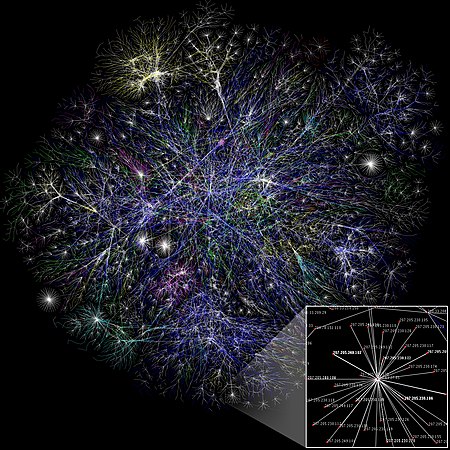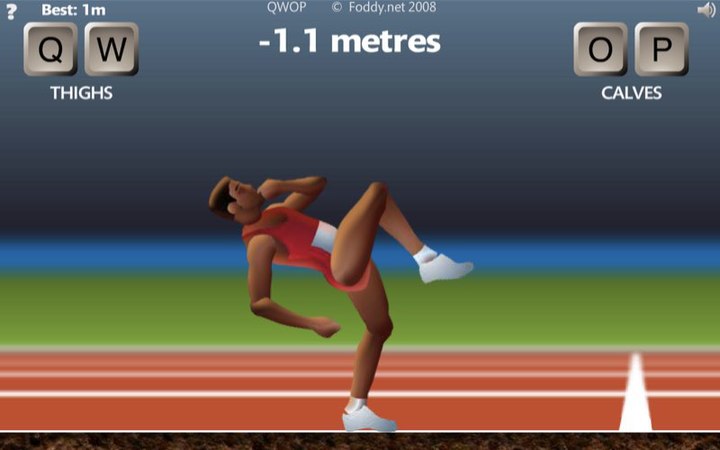History of video games/Web
1990's
[edit | edit source]Origin of Standards
[edit | edit source]The first version of the programming language JavaScript is developed in just 10 days, eventually becoming the de facto locally run scripting language on the web.[1]
While not a true web standard, the first form of Flash is developed in 1996, enabling web animations through use of a plug in.[2] The high demand for such content quickly turns Flash into a de facto standard of sorts, though not an open one.
CSS level 1 is recommended by W3C on December 17, 1996.[3]
2000's
[edit | edit source]Rise of Web 2.0
[edit | edit source]The emergence of Web 2.0 and user generated content lead to the proliferation of game modding and machinima among gamers.[4]
Browser Monoculture under IE6
[edit | edit source]The end of the first browser war between Internet Explorer and Netscape Navigator ends with Netscape failing and web technologies stagnating hard for five years, and being stifled long afterwards.[5][6] After being in development since 1998, the first version of Firefox (Then the Phoenix Web Browser of the Mozilla Application Suite version 1.0) released in 2002, built from the open sourced remains of Netscape.[7][8] At the time Internet Explorer had over a 90% market share.[8]
The stagnation of web browsers lead to developers take advantage of browser plugins like Flash and Java to make their games, neither of which were ideal. Flash had poor 3D and networking support, and had serious performance issues.[9]
Peak Flash
[edit | edit source]During the 2000's Flash games enter their peak, with many becoming widely popular.[10] In 2005 Adobe purchases Macromedia, the company that owns Flash Player, for 3.4 billion dollars.[11]
When the iPhone launches, Steve Jobs refuses to allow Flash on Apple's mobile platforms, instead preferring more efficient and open technologies to handle tasks Flash is used for.[12][13]
Gallery
[edit | edit source]-
A partial map of the Internet in 2005. During this decade use of the Internet, and especially the World Wide Web, rapidly took off.
-
A Yahoo! Games booth at E3 2005.
-
QWOP in 2008, an innovative browser game.
2010's
[edit | edit source]Web Standards Evolve
[edit | edit source]In 2014 HTML5 is finalized.[14]
Web Assembly entered widespread adoption in 2017, enabling faster web applications, including games running on web browsers.[15][16]
In 2016 Mozilla and the Google Chrome team collaboratively launched a WebVR API proposal to enable virtual reality support on the web.[17] WebVR was superseded by WebXR in 2018 to include augmented reality and mixed reality support for web browsers.[18][19]
Engines of Development
[edit | edit source]The engine Twine began commonly being used to bring interactive fiction to the web.[20][21]
Browser Monoculture under Chrome & Blink
[edit | edit source]By the late 2010's many sites began requiring the use of Google Chrome, leading to fears that browser technology may once again turn stagent[22]
Gallery
[edit | edit source]-
Socrates Jones: Pro Philosopher, an educational browser game from 2013.
-
A Facebook Gaming Booth at PAX west 2018.
2020's
[edit | edit source]End of Flash
[edit | edit source]Adobe has planned to end support for Flash Player on December 31st, 2020.[23] Also in 2020, the Internet Archive launches an in browser flash emulator to preserve old flash content.[24]
Other Developments
[edit | edit source]Notably on February 12th, 2021 Microsoft briefly promoted an unauthorized emulator for Mario Kart 64 on their Edge browser, before pulling the announcement.[25][26]
Notable Web Based Games
[edit | edit source]- Runescape
- Urban Dead
- Fallen London
- Agar.io
- Blaseball
Sony Station
[edit | edit source]An online game platform.[27]
Monopoly City Streets
[edit | edit source]A 2009 browser game featuring an early attempt to integrate geographical features from the real world into gameplay.[28]
Don't Look Back
[edit | edit source]A 2009 flash 2D shooter which is noted for integrating it's mechanics with the story of Orpheus and Eurydice, increasing the difficulty of the game considerably by ending the game should the player look back during the second half.[29]
LEGO.com Flash games
[edit | edit source]A notable and ever-changing collection of LEGO-themed Flash games, some of which have now been collected in an online archive.
Neopets
[edit | edit source]Though its general relevance declined, a small number of dedicated gamers kept playing two decades after its heyday.[30]
Mario Net Quest
[edit | edit source]A 1997 Shockwave Flash game made in collaboration between Nintendo, IBM, and C3 Entertainment.[31]
References
[edit | edit source]- ↑ "CSDL IEEE Computer Society". www.computer.org. Retrieved 5 November 2020.
- ↑ "The Birth and Death of Flash". StreamShark. 31 March 2017. Retrieved 4 November 2020.
- ↑ "20 Years of CSS". www.w3.org. Retrieved 10 November 2020.
- ↑ "Modding: Games and Web 2.0".
- ↑ Hutchinson, Lee (9 April 2014). "Looking at the Web with Internet Explorer 6, one last time". Ars Technica. Retrieved 24 November 2020.
- ↑ Warren, Tom (4 May 2019). "Former Google engineer reveals the secret YouTube plot to kill Internet Explorer 6". The Verge. Retrieved 24 November 2020.
- ↑ "Browser History: Epic power struggles that brought us modern browsers". Mozilla. Retrieved 24 November 2020.
- ↑ a b "History of the Mozilla Project". Mozilla. Retrieved 24 November 2020.
- ↑ "Flash Limitations > First Steps of Flash Game Design Adobe Press". www.adobepress.com. Retrieved 24 November 2020.
- ↑ Villa, Jesse (2 February 2019). "Gaming on the Web: The Rise and Fall of Browser Games". Medium. Retrieved 22 December 2020.
- ↑ Flynn, Laurie J. (19 April 2005). "Adobe Buys Macromedia for $3.4 Billion (Published 2005)". The New York Times. Retrieved 4 November 2020.
- ↑ Pathak, Khamosh. "How to Use Adobe Flash on Your iPhone or iPad". How-To Geek. Retrieved 4 November 2020.
- ↑ "Thoughts on Flash". web.archive.org. 22 July 2010. Retrieved 4 November 2020.
- ↑ "HTML5 finalized, finally". PCWorld. 28 October 2014. Retrieved 10 November 2020.
- ↑ Krill, Paul (6 March 2017). "WebAssembly is now ready for browsers to use". InfoWorld. Retrieved 10 November 2020.
- ↑ "WebAssembly for Native Games on the Web – Mozilla Hacks - the Web developer blog". Mozilla Hacks – the Web developer blog. Retrieved 10 November 2020.
- ↑ "Introducing the WebVR 1.0 API Proposal – Mozilla Hacks - the Web developer blog". Mozilla Hacks – the Web developer blog. Retrieved 24 November 2020.
- ↑ "New API to Bring Augmented Reality to the Web – Mozilla Hacks - the Web developer blog". Mozilla Hacks – the Web developer blog. Retrieved 24 November 2020.
- ↑ "Welcome to the immersive web". Google Developers. Retrieved 24 November 2020.
- ↑ Robertson, Adi (10 March 2021). "Text Adventures: how Twine remade gaming". The Verge. https://www.theverge.com/22321816/twine-games-history-legacy-art.
- ↑ Ellison, Cara (10 April 2013). "Anna Anthropy and the Twine revolution". The Guardian. https://www.theguardian.com/technology/gamesblog/2013/apr/10/anna-anthropy-twine-revolution.
- ↑ Warren, Tom (4 January 2018). "Chrome is turning into the new Internet Explorer 6". The Verge.
- ↑ "Adobe Flash end of support on December 31, 2020 - Microsoft Lifecycle". docs.microsoft.com. Retrieved 4 November 2020.
- ↑ "Flash Animations Live Forever at the Internet Archive".
- ↑ Peters, Jay (12 February 2021). "Microsoft’s Edge extensions store hosted illicit copies of Sonic and Mario Kart 64" (in en). The Verge. https://www.theverge.com/2021/2/12/22281033/microsoft-edge-extensions-mario-kart-64-sonic-minecraft-games.
- ↑ "Microsoft's Edge Extensions Store Has Reportedly Been Hosting Illegal Copies Of Nintendo Games". Nintendo Life. 13 February 2021. https://www.nintendolife.com/news/2021/02/microsofts_edge_extensions_store_has_reportedly_been_hosting_illegal_copies_of_nintendo_games.
- ↑ "Sony Online Entertainment Announces A Diverse Lineup Of Games Available At Newly Revamped Station.Com". www.sony.com. Retrieved 4 July 2021.
- ↑ "'Monopoly City Streets' Online Game: Will Buying Park Place Be Any Easier?" (in en). PCWorld. 8 September 2009. https://www.pcworld.com/article/171610/Monopoly_Meets_Google_With_Monopoly_City_Streets.html.
- ↑ Short, Emily. "Analysis: Don't Look Back - Cavanagh's Alternate Game Viewpoints" (in en). gamasutra.com. https://gamasutra.com/view/news/115375/Analysis_Dont_Look_Back__Cavanaghs_Alternate_Game_Viewpoints.php.
- ↑ Morley, Madeleine (3 November 2021). "‘I Could Never Abandon Them’: Neopets Users Play On". The New York Times. https://www.nytimes.com/interactive/2021/11/03/arts/design/neopets.html.
- ↑ McFerran, Damien (24 April 2023). "Internet Sleuth Finds "Lost" Super Mario Browser Game From 1997". Time Extension. https://www.timeextension.com/news/2023/04/internet-sleuth-finds-lost-super-mario-browser-game-from-1997.




